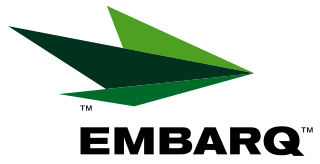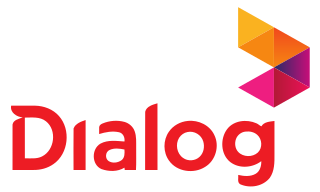
Telecommunications in Ghana include radio, television, fixed and mobile telephones, and the Internet.
Nepal's telecommunication network has increased over the years significantly, with the number of telephone users reaching 40,789,198 as of 14 May 2019.
The Universal Mobile Telecommunications System (UMTS) is a 3G mobile cellular system for networks based on the GSM standard. Developed and maintained by the 3GPP, UMTS is a component of the International Telecommunication Union IMT-2000 standard set and compares with the CDMA2000 standard set for networks based on the competing cdmaOne technology. UMTS uses wideband code-division multiple access (W-CDMA) radio access technology to offer greater spectral efficiency and bandwidth to mobile network operators.
A SIM lock, simlock, network lock, carrier lock or (master) subsidy lock is a technical restriction built into GSM and CDMA mobile phones by mobile phone manufacturers for use by service providers to restrict the use of these phones to specific countries and/or networks. This is in contrast to a phone that does not impose any SIM restrictions.

SK Telecom Co., Ltd., abbreviated as SKT is a South Korean wireless telecommunications operator and former film distributor and is part of the SK Group, one of the country's largest chaebols. It leads the local market with 50.5 percent share as of 2008. SK Telecom is the largest wireless carrier in South Korea, with 23 million subscribers as of Q4 2023.

e&, formerly branded as Etisalat, is a UAE state-owned telecommunications company. It is the 16th largest mobile network operator in the world by number of subscribers.
Nepal Saar Doorsanchar Company Ltd., popularly known as Nepal Telecom or NTC, is a state-owned telecommunications service provider in Nepal. The company was a monopoly until 2003, when the first private sector operator, United Telecom Limited (UTL), started providing basic telephone services. The central office of Nepal Telecom is located at Bhadrakali Plaza, Kathmandu. It has branches, exchanges, and other offices in 184 locations within the country.

Vodafone Ukraine is the second-largest mobile operator in Ukraine with 23.1 million users and thus a 38 percent market share. In November 2009 it had 17.74 million GSM subscribers. The company is fully owned by NEQSOL Holding. In October 2015 Mobile TeleSystems (MTS) and Vodafone expanded their 2008 strategic partnership; this resulted in the rebranding of MTS Ukraine to Vodafone Ukraine.

The Claro Company, or simply Claro, is a Latin American telecommunications company, part of América Móvil, a Mexican telecom group. Claro serves customers in Argentina, Brazil, Chile, Colombia, Costa Rica, the Dominican Republic, Ecuador, El Salvador, Guatemala, Honduras, Mexico, Nicaragua, Panama, Paraguay, Peru, Puerto Rico and Uruguay. Its Mexican operations are branded as Claro Mexico. The company's name means "bright," "clear," and also "of course," in both Portuguese and Spanish.
LG Uplus Corp. (Korean: LG유플러스; stylized as LG U+, KRX: 032640) is a South Korean mobile network operator owned by LG Corporation. It was formerly known as LG Telecom, but changed to its current name on July 1, 2010. LG Uplus is the second-largest wireless carrier in South Korea, with 18.411 million subscribers as of Q4 2023.

Embarq Corporation was the largest independent local exchange carrier in the United States, serving customers in 18 states and providing local, long-distance, high-speed data and wireless services to residential and business customers. It had been formerly the local telephone division (LTD) of Sprint Nextel until 2006, when it was spun off as an independent company. Embarq produced more than $6 billion in revenues annually, and had approximately 18,000 employees. It was based in Overland Park, Kansas.

Dialog Axiata PLC, is one of Sri Lanka's largest telecommunications service providers, and the country's largest mobile network operator with over 17 million subscribers which amounts to 57% of the Sri Lankan mobile market. Dialog is a subsidiary of Axiata Group Berhad which owns 73.75% controlling stake of the company, while Bharti Airtel owns 10.36%.

América Móvil, S.A.B. de C.V. is a Mexican telecommunications corporation headquartered in Mexico City, Mexico. It is the 7th largest mobile network operator in the world in terms of equity subscribers, as well as one of the largest corporations in the world. América Móvil is a Forbes Global 2000 company. As of 31 December 2023, América Móvil had 310.1 million wireless subscribers, and 73.7 million fixed revenue generating units.

Bharti Airtel Limited is an Indian multinational telecommunications company based in New Delhi. It operates in 18 countries across South Asia and Africa, as well as the Channel Islands. Currently, Airtel provides 5G, 4G and LTE Advanced services throughout India. Currently offered services include fixed-line broadband, and voice services depending upon the country of operation. Airtel had also rolled out its Voice over LTE (VoLTE) technology across all Indian telecom circles. It is the second largest mobile network operator in India and the second largest mobile network operator in the world. Airtel was named India's 2nd most valuable brand in the first ever Brandz ranking by Millward Brown and WPP plc.

Sudatel Telecommunication Group is a telecommunications and Internet service provider in Sudan. The company is responsible for the construction and maintenance of Sudan's telecom infrastructure. Sudatel is more than 60% owned by the Sudanese government; the remainder being owned by private interests. Its stock is listed on the Bahrain Stock Exchange.
Hutchison Asia Telecom Group or HAT, is a division of Hong Kong-based multinational conglomerate CK Hutchison Holdings. The division provides telecommunications services to several Asian countries. The division was formerly incorporated as Hutchison Telecommunications International Limited, known as Hutchison Telecom or HTIL in short. It was an offshore company in the Cayman Islands and a listed company in the Stock Exchange of Hong Kong. It operates GSM, 3G and 4G mobile telecommunications services in Indonesia, Sri Lanka and Vietnam under brands 3, Hutch and Vietnamobile.
Express Telecommunication Company, Inc. is a subsidiary of Vega Telecom. It was the Philippines' first mobile phone network operator and operated an analog AMPS network.

Syniverse is an American communications technology company with a focus on 5G roaming, communications platform as a service (CPaaS), A2P Messaging, roaming clearing and settlement, IPX, fraud prevention, mobile identify and authentication solutions, IoT, Private Networks and other emerging technologies leveraged by global enterprises and telecommunication carriers.
Centre for Excellence in Telecom Technology and Management (CETTM) located in Hiranandani Gardens, Powai, Mumbai is the telecom training centre of MTNL, the incumbent operator of Government of India (GOI). It was founded in 2003 as one of the largest telecom training centres in India and amongst the biggest in Asia. The Centre provides extensive training to corporate employees, students, and MTNL's internal employees in telecom switching, transmission, wireless communication, telecom operations and management.
3G mobile telephony was relatively slow to be adopted globally. In some instances, 3G networks do not use the same radio frequencies as 2G so mobile operators must build entirely new networks and license entirely new frequencies, especially so to achieve high data transmission rates. Other delays were due to the expenses of upgrading transmission hardware, especially for UMTS, whose deployment required the replacement of most broadcast towers. Due to these issues and difficulties with deployment, many carriers delayed acquisition of these updated capabilities.










